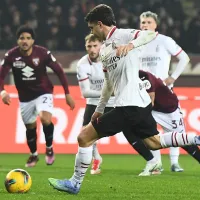AC Milan‘s 2-1 defeat against Torino in a Serie A match was overshadowed by a post-match controversy involving Mexican striker Santi Gimenez and American winger Christian Pulisic. The fallout centers on a missed penalty kick during the first half, with reports suggesting a disagreement between the two players over who should have taken the spot kick.
This incident has led to a wave of discussion amongst AC Milan supporters, raising questions about the team’s penalty-taking strategy and the relationship between its key players.
Milan, already trailing 1-0 following an early own goal, was awarded a penalty in the 33rd minute. Reports suggest a disagreement arose between Gimenez and Pulisic over who should take the penalty.
Pulisic ultimately took the penalty but missed, a crucial moment that contributed to the loss. This missed opportunity fueled debate amongst fans, many of whom felt that Gimenez, given his consistent success from the penalty spot at his previous club Feyenoord, should have taken the penalty.
STREAK ENDED 😫 Christian Pulisic is denied from the penalty spot for the first time in his career by Torino's Vanja Milinković-Savić! ❌
Gimenez’s previous experience at Feyenoord
This isn’t the first time Gimenez has been involved in a penalty-taking controversy. During his time at Feyenoord, he challenged the established penalty taker, Orkun Kökçü (the team captain), for the spot-kick duties early in his time with the club.
While this resulted in a minor internal discussion, it was quickly resolved. This prior experience has added another layer to the current situation at AC Milan, fueling further debate about how teams should manage penalty-taking responsibilities.
The incident involving Gimenez and Pulisic highlights broader questions about penalty-taking responsibilities and the importance of establishing clear protocols within a team. The lack of a clearly designated penalty taker and the ensuing disagreement have raised concerns about potential internal divisions within the Milan squad. This incident could have long-term consequences, affecting both the team’s penalty success rate and its internal team dynamic.















